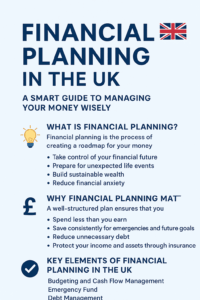
Financial Planning in the UK: A Smart Guide to Managing Your Money Wisely
In today’s volatile economy, financial planning is no longer a luxury reserved for the rich — it’s an essential tool for anyone who wants security, stability, and long-term prosperity. For people and families all over the UK, knowing how to manage money on a day-to-day basis, as well as learning to save and invest it for long-term security can make all the difference between worrying about money and feeling financially free.
Here, we explain the basic principles of financial planning, the main tools at your disposal in the UK and how you can make a plan just for you.

💡 What Is Financial Planning?
Financial planning is the step-by-step process of outlining how you’ll earn, save, invest and spend your money in order to accomplish specific long- and short-term financial goals. It helps you:
- Seize your financial future
- Prepare for unexpected life events
- Build sustainable wealth
- Reduce financial anxiety
A good plan is going to consider your entire financial situation — everything from budgeting to investments, insurance, retirement.
💷 Why Financial Planning Matters
Most of us undervalue financial planning until there’s a crisis — loss of income, increased expenses, surprise bills. An Effective Plan Helps You, By following these strategies you will be:
- Spend less than you earn
- Put aside money regularly for a rainy day — or big dreams
- Reduce unnecessary debt
- Insure your income, your assets
- Invest Invest your money in the right places
In simple terms, financial planning is the base of permanent wealth and tranquility.
🧾 Key Elements of Financial Planning in the UK
1. Budgeting and Cash Flow Management
The cornerstone of any plan is knowing where your money goes.
Track your income and expenses using digital tools or spreadsheets, and aim to allocate funds for essentials, savings, and discretionary spending.
A well-managed budget gives you control and clarity.
2. Emergency Fund
Life is unpredictable — from job loss to medical emergencies.
Building an emergency fund covering at least 3–6 months of expenses can prevent you from falling into debt during tough times.
3. Debt Management
Credit cards, personal loans, or mortgages can drain your income if not managed carefully.
Prioritise high-interest debt first, consolidate where possible, and avoid borrowing for non-essential items.
4. Savings and Investments
Once your basics are covered, start investing.
Use tax-efficient accounts such as ISAs or pensions, and explore diversified options like mutual funds, ETFs, or property.
Long-term investing helps you outpace inflation and build true financial independence.
5. Insurance and Protection
Protect your family and assets with life insurance, income protection, and critical illness cover.
Financial planning isn’t only about growing money — it’s also about preserving it.
6. Retirement Planning
Start early, contribute regularly, and take advantage of employer pension matches.
UK residents have access to state pensions and private pension schemes, both of which are vital for a secure retirement.
⚖️ Tax Efficiency and Legal Considerations
In the UK, a certain degree of tax-efficient planning can make a massive dent in your financial results.
Leverage tools like:
- ISAs (Individual Savings Accounts) – which provide tax-free growth on savings and investments.
- Pension Contributions –Enjoy tax relief from the Government.
- Gift Exemptions – Lower your inheritance tax liability by using gifting allowances.
As always, be sure to check with your tax adviser and financial planner on setting up an effective strategy.
🧠 Sustainable and Ethical Financial Planning
Modern investors are increasingly choosing to align their financial goals with their values.
Sustainable and ethical planning focuses on funding companies that prioritise environmental, social, and governance (ESG) principles.
This approach ensures your money contributes to a better future without sacrificing returns.
🚫 Common Financial Planning Mistakes
Ignoring your budget – leads to overspending and debt.
Not having a plan – makes it hard to track progress or achieve goals.
Neglecting protection – no insurance means unnecessary vulnerability.
Failing to review regularly – your plan should evolve with your life.
🎯 Conclusion: Take Control of Your Financial Future
Financial planning is about more than numbers — it’s about building the life you want.
By creating a strategy that balances spending, saving, investing, and protection, UK individuals can achieve true financial independence.
With consistency, discipline, and the right advice, you can turn your income into lasting wealth and secure your financial future for decades to come.
Our Post


The Resilient Pound: Navigating the UK’s New Economic Landscape


